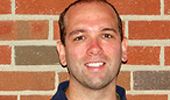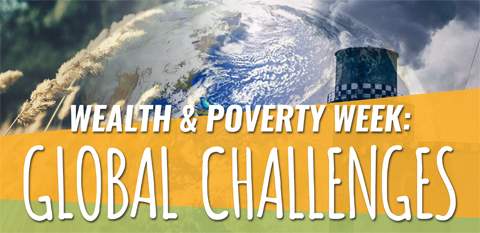 The Global Challenges week, from Sept. 26-30, brings together Ohio University students, faculty, staff, and community members who share an academic interest in the major global challenges of today and tomorrow. This week-long event focuses on global hunger, climate change, health crises, and human disasters which can only be addressed through the pooling and sharing of knowledge across disciplines.
The Global Challenges week, from Sept. 26-30, brings together Ohio University students, faculty, staff, and community members who share an academic interest in the major global challenges of today and tomorrow. This week-long event focuses on global hunger, climate change, health crises, and human disasters which can only be addressed through the pooling and sharing of knowledge across disciplines.
Most of the events can be viewed live or following the event on A&S TV.
- Tuesday, Sept. 27 – Ryan Fogt (Geography) on “The Causes of Global Climate Change over the Last Century and Our Hope for the Future,” 10:30-11:30 a.m. at Alden 319. Watch on A&S TV.
Abstract: The calendar year 2015 was marked as the hottest year on record, globally averaged, far exceeding the previous record in 2014. Historical temperatures over the last century also indicate a positive trend, i.e. toward warmer temperatures, that is seen uniformly at Earth’s surface everywhere except in the North Atlantic. Furthermore, annual mean temperature data suggest that the rate of warming has increased dramatically during the last 50 years, implying a global acceleration of warming due to non-linear feedbacks in the coupled ocean-atmosphere-ice climate system. Despite small imperfections, coupled climate models that simulate these feedbacks serve as the most important tool to understanding the human footprint on the global temperature increase. All such climate models demonstrate that continuous warming is only present in simulations that include increases in greenhouse gas concentrations. The climate models also show an insignificant role from natural climate variability in the current warming trends. Together these results strongly indicate a dominant effect of human activity on global climate change. While this points at discouraging news for our future, it also means that we as humans can be part of the solution to combat global climate change. The talk will briefly touch on a few ways that we can begin to confront global climate change and instill hope for a better and more environmentally friendly future, yet still honestly identifying it as a concerning global challenge for future generations.

Dr. Ryan Fogt
Biography: Fogt is Associate Professor of Geography and Director of the Scalia Laboratory for Atmospheric Analysis at Ohio University. His research interests span a wide range of topics on climate variability and change, with a particular focus on understanding the relative roles of natural climate variability from anthropogenic climate change in Antarctica. Fogt earned a B.S. in Atmospheric Sciences from Creighton University, and an M.S. and Ph.D. in Atmospheric Sciences from the Ohio State University. Before coming to Ohio University, he was a National Research Council Postdoctoral Research Fellow with the NOAA Earth System Research Laboratory.




















Comments